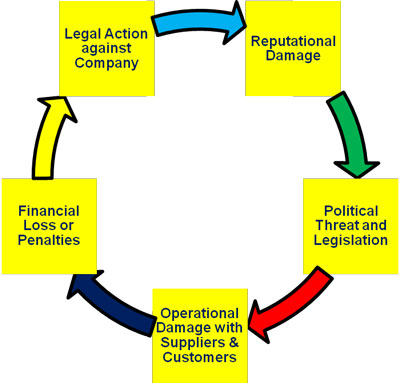Presented at the International Symposium on Children's Welfare and their Rights held by the Japanese Society of Child Science and
Child Research Net
Main Hall, Okayama Head Office of Benesse Corporation
October 14, 2013
How can Business make a Difference to the Welfare and Rights of Children?
- Part1 (This paper)
- Part2
Whilst the international laws and initiatives aimed at securing the rights of children are extensive, it was only in March 2013 that UNICEF, UN Global Compact and Save the Children jointly advocated a position on Children's Rights and Business Principles. This major initiative now requires strong advocates and widespread public debate to convert the words and principles into action and to produce real outcomes and progress. Accelerating "Progress" is what business does best and the International Business Community must rise to the challenge on Children's Rights.
What are the Principal Child Rights adopted by the United Nations?
The over-riding principle adopted by the United Nations is that - "All human beings are born free and equal in dignity and rights". In this regard, children specifically have:
- A right of access to primary health care;
- A right to securely access play free from exploitation and violence;
- A right to education;
- A right to access quality food for their nourishment, development and general wellbeing;
- A right to access clean water to drink and bath;
- A right to be protected from physical, psychological and social harm; and
- A right to a good standard of living.
United Nations General Principles on Child Rights
In relation to child rights the State has a duty to protect. As such, it is part of the general State regulatory and policy functions to provide guidance to business on considering issues of vulnerability, including challenges faced by children.
Business for its part has a responsibility to respect human rights of specific groups or populations requiring particular attention, including children.
Further, it cannot be assumed that the matter of 'children's rights' is uniquely a third world issue. The rights of children are impacted constantly in wealthy developed societies.
Business can support children's rights, particularly through the exercise of corporate social responsibility, across a broad spectrum. This paper focuses upon how business can make a difference. Business can scrutinise their labour practices in the supply chain, ensure appropriate and socially responsible advertising, manufacture safe products and healthy foods (children don't always have the right to exercise choice), eliminate corruption as a prime business ethic, and ensure that corporate taxes are fairly paid, as they support child education, health and welfare in our societies.
United Nations Business Principles for Child Rights
In 2010 a specifically constituted UN Committee conducted consultations regarding the Business sector and the development of general principles on 'Child Rights'. The Committee sought guidance on preventing and remedying violations by business actors; ensuring businesses carry out their responsibilities; and to encourage businesses to positively contribute to the realisation of child rights.
The UN Committee recommendations adopted by the UN at the conclusion of their consultations, provided for all Businesses to:
| Accept responsibility to respect and support children's rights; | Use marketing and advertising that respect and support children's rights; |
| Contribute to the elimination of child labour in their business activities/relationships; | Respect and support children's rights with respect to the environment, land acquisition and use; |
| Provide decent work for young workers, parents and caregivers; | Respect and support children's rights in security arrangements; |
| Ensure the protection and safety of children in all business activities and facilities; | Help protect children affected by emergencies; |
| Ensure that products and services are safe, and support children's rights through them; | Reinforce community and government efforts to protect and fulfil children's rights. |
Positive Drivers for Business to Embrace Child Rights
For Business there are overwhelmingly positive drivers that encourage Business to embrace the UN Business Principles in supporting human rights generally and 'child rights', in particular. These include:
EthicsSocieties depend on order for their growth and development. The acceptance of a business ethic conforms to the expectations of society. Recognising and supporting child rights is ethically the right thing to do. The social norm of treating others as one would expect others to do unto thee, very much applies;
ReputationSupporting child rights helps companies to build a positive reputation with communities, investors, shareholders, governments, and the media;
Business ClimateThe business climate will always be more positive where business supports child rights. The business will gain more recognition and trust from communities and governments, who will be more predisposed towards a caring and responsible business;
Social Licence to OperateA business that supports child rights will be more likely to be granted a local 'social licence to operate' within the particular community through trust and good will;
Access to New Business OpportunitiesA new business in-country or elsewhere is more likely to gain access to business opportunities where they have a track record of supporting child rights and communities;
Employee RespectNew and current employees prefer companies that respect human rights. Employees are part of the community at large and want to have a sense of pride for the businesses they seek to work with and for.
The Negative Impacts for Businesses that Do Not Embrace Child Rights
Businesses that fail to support child rights and accept their responsibilities and moral obligations are at high risk, and their behaviours may seriously impact on the business's profitability, continuing status and ability to operate. The most likely forms of negative impact can be summarised in the following schematic:

| | 1 | 2 | |














